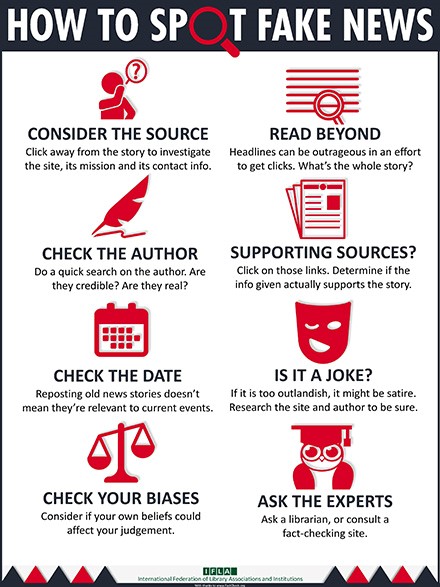New Voices RGU Student Series: Ashley Count
Category: New Voices, New Voices
This blog is posted as part of our New Voices RGU Student Series, where we are publishing blogs written by Robert Gordon University Information and Library Studies Students as part of their coursework.
About the writer: Ashley Count is a library assistant at a secondary academy in Oxfordshire, England. She is currently studying an MSc in Information and Library Sciences online at Robert Gordon University between working, writing, technical editing, and metal detecting.
Fighting fake news: what can a school librarian do?
 Do you remember a time before ‘fake news’ was Collins Dictionary’s Word of the Year (BBC 2017), or before Hillary Clinton (not Trump) first used the phrase on her doomed campaign trail for the US presidency? I’m not sure my students do. The Year 7s at my English secondary school especially—a mere eight years old when Donald Trump was elected president—are quite familiar with the phrase; they don’t hesitate to use it either in class when talking about untrustworthy sources, or to dismiss gossip (often with a certain amount of irony) on the playground. Kids know about it, but they can’t necessarily spot it. As librarians—those traditional guardians of truth—isn’t it our job to help them?
Do you remember a time before ‘fake news’ was Collins Dictionary’s Word of the Year (BBC 2017), or before Hillary Clinton (not Trump) first used the phrase on her doomed campaign trail for the US presidency? I’m not sure my students do. The Year 7s at my English secondary school especially—a mere eight years old when Donald Trump was elected president—are quite familiar with the phrase; they don’t hesitate to use it either in class when talking about untrustworthy sources, or to dismiss gossip (often with a certain amount of irony) on the playground. Kids know about it, but they can’t necessarily spot it. As librarians—those traditional guardians of truth—isn’t it our job to help them?
Since its advent in the 19th century (Hamilton 2019), fake news (fictional stories presented as fact (Collins 2017)) has adapted, and so then has the concept of media literacy: the ability to engage critically with media ranging from news articles to Facebook posts and WhatsApp messages (Armstrong et al. 2005; Common Sense Media [n.d.]). Along with this adaptation, there is a growing concern from information professionals regarding mis- and dis-information’s impact on general citizenship and democracy (Batchelor 2017). Ofcom (2018) found that only 60% of UK children aged 12-15 would take some sort of action when encountering suspected fake news. We still don’t know how well they can actually identify it. The Great School Libraries Campaign (2019) and Batchelor (2017) have argued that school librarians are instrumental in the fight against it. What can we do? There are a few possibilities.

The president uses the phrase “fake news” on average once per day (Trump 2019). Trump’s use of the phrase differs somewhat from the standard definition.
The previous Education Secretary expressed interest in encouraging schools to teach ‘fake news education’ (Murray 2019). If enacted, this role would undoubtedly fall to teachers, but I would urge librarians to seek training in teaching media literacy skills (a subject we are uniquely qualified in), and to help build a schoolwide curriculum. Many of us already teach library skills; this could simply be an extension. Helpfully, IFLA have provided some resources, and numerous organisations offer media literacy curricula for our consideration.
There is, however, uncertainty over whether education on its own is enough to combat misinformation. Parliament doesn’t seem to think so. The Digital, Culture, Media and Sport Committee (2019) has pointed the finger squarely at online platforms for their dissemination of fake news, and some of these platforms have expressed reluctance to fully comply with recommendations; there is a further risk as fake news grows increasingly sophisticated. Sullivan (2018) agrees that education on its own is insufficient and that library and information professionals need to “engage with and contribute to technological solutions that can assist in identifying unverified or outright false information” (p. 1154). A number of public libraries now use browser plugins such as Newsguard to provide users with more information about sites they visit, with ratings based on aspects such as sources of funding and reliability. The School Library Association (2019) is exploring the possibility of promoting Newsguard to schools: for use on school computers, and perhaps encouraging parents to install it at home. While some question these plugins’ total infallibility (Oremus 2019), the plugin is free, promising, and once rolled out, would require very little maintenance by staff.
The perfect solution to fake news may be far away, but for now, we have a duty of care to our students, and at least a few tools at hand.
References
ARMSTRONG, C. et al., 2005. Defining information literacy for the UK. Library & Information Update, 4(1-2), pp. 22-25.
BATCHELOR, O., 2017. Getting out the truth: the role of libraries in the fight against fake news. Reference Services Review, 45(2), pp. 143-148.
BBC, 2017. What is 2017’s word of the year? [online]. London: BBC. Available from: https://www.bbc.co.uk/news/uk-41838386 [Accessed 13 October 2019].
COLLINS, 2019. Definition of ‘fake news’ [online]. Glasgow: HarperCollins Publishers. Available from: https://www.collinsdictionary.com/dictionary/english/fake-news [Accessed 15 October 2019].
COMMON SENSE MEDIA, [n.d.]. What is media literacy, and why is it important? [online]. San Francisco: Common Sense Media. Available from: https://www.commonsensemedia.org/news-and-media-literacy/what-is-media-literacy-and-why-is-it-important [Accessed 13 October 2019].
DIGITAL, CULTURE, MEDIA AND SPORT COMMITTEE, 2019. Disinformation and ‘fake news’: Final Report. (Damian Collins MP). London: UK Parliament.
IFLA, 2019. How to spot fake news. [online]. The Hague: IFLA. Available from: https://www.ifla.org/publications/node/11174 [Accessed 14 October 2019].
GREAT SCHOOL LIBRARIES, 2019. Great School Libraries survey findings and update on Phase 1 [online]. London: Great School Libraries. Available from: https://drive.google.com/file/d/1rjo_wPFjwppcl3e-DrJMk7CAH9JJnMMc/view [Accessed 17 October 2019].
HAMILTON, J., 2019. In a battle for readers, two media barons sparked a war in the 1890s [online]. Washington, D.C.: National Geographic. Available from: https://www.nationalgeographic.com/history/magazine/2019/03-04/yellow-journalism-role-spanish-american-war/ [Accessed 17 October 2019].
MURRAY, J., 2019. Schools to teach pupils about perils of fake news and catfishing. The Guardian. [online]. 26 June 2019. Available from: https://www.theguardian.com/technology/2019/jun/26/schoolchildren-to-get-online-safety-advice-on-catfishing-and-fake-news [Accessed 13 October 2019].
OFCOM, 2018. Children and parents: Media use and attitudes report 2018 [online]. London: Ofcom. Available from: https://www.ofcom.org.uk/__data/assets/pdf_file/0024/134907/children-and-parents-media-use-and-attitudes-2018.pdf [Accessed 13 October 2019].
OREMUS, W., 2019. Just trust us [online]. Washington, D.C.: Slate. Available from: https://slate.com/technology/2019/01/newsguard-nuzzelrank-media-ratings-fake-news.html [Accessed 15 October 2019].
SCHOOL LIBRARY ASSOCCIATION, 2019. Newsguard for critical literacy or Fake News [online]. Swindon: School Library Association. Available from: https://www.sla.org.uk/article/chris-riddell/newsguard-for-critical-literacy-or-fake-news/1614 [Accessed 18 October 2019].
SULLIVAN, M. C., 2018. Why librarians can’t fight fake news. Journal of Librarianship and Information Science. 51(4), pp. 1146-1156.
TRUMP, D., 2019. The Fake News Media wants to stay as far away as possible from the Ukraine and China deals. [Twitter]. 30 September 2019. Available from: https://twitter.com/realDonaldTrump/status/1178671715624394757 [Accessed 15 October 2019].
**The views expressed in our guest blogs are the writer’s and do not necessarily reflect the views of CILIPS**
